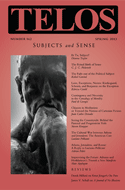In today’s episode of the Telos Press Podcast, David Pan talks with Stephen Muecke about his article “Belonging in Aboriginal Australia: A Political ‘Cosmography,'” from Telos 202 (Spring 2023). An excerpt of the article appears here. In their conversation they discuss how cosmography rather than ethnography allows for a focus on epistemological and ontological pluralism, and what such pluralism means for the essay’s cosmographic analysis; whether ontological pluralism is fundamentally incompatible with monotheistic religion and the institutions that have derived from it; how important for the essay’s analysis is institutional belonging, and whether the centering effect of such belonging could conflict with an ontological pluralism; how Native Title in the Australian legal system is grounded in the idea of genealogy, and whether this orientation undermines or contradict the forms of title and territorial sovereignty documented in Goolarabooloo practices; and the key differences between the Goolarabooloo practices and Yawuru nationalism. If your university has an online subscription to Telos, you can read the full article at the Telos Online website. For non-subscribers, learn how your university can begin a subscription to Telos at our library recommendation page. Print copies of Telos 202 are available for purchase in our online store.
|
Paul di Georgio’s “Contingency and Necessity in the Genealogy of Morality” appears in Telos 162 (Spring 2013). Read the full version online at the Telos Online website, or purchase a print copy of the issue in our store. |
||||
|
Telos Press Publishing · PO Box 811 · Candor, NY 13743 · Phone: 212-228-6479 Privacy Policy · Data Protection Copyright © 2024 Telos Press Publishing · All Rights Reserved |
||||
 This article evaluates the relationship of the concepts of contingency and necessity to the historical developments and power relations in Nietzsche’s Genealogy. Both Nietzsche and Foucault maintain that, contra Herder, their genealogies are not grounded in originary investigation. Thus for their sort of genealogy to be a philosophically useful method, the force of interpretive analysis must be located elsewhere. The analytic force, I argue, is based in the relationship of values, events, and moral beings. Specifically, I maintain that the progression of moral stages in Nietzsche’s study is ordered in such a way that the failure of each stage is logically and structurally necessary, and that each failure structures the resultant system or paradigm. However, we must also note that the historical manifestation of moral paradigms which coincide with predicted or projected theoretical structures remains contingent upon a multitude of other historical factors, most importantly, human involvement. The conclusion is that systematic internal failures of moral stages allow for but do not cause successive events, since the structural scope of possibility within which a value may be held is best explained in terms of a “middle space” characterizable in both contingent and necessary terms.
This article evaluates the relationship of the concepts of contingency and necessity to the historical developments and power relations in Nietzsche’s Genealogy. Both Nietzsche and Foucault maintain that, contra Herder, their genealogies are not grounded in originary investigation. Thus for their sort of genealogy to be a philosophically useful method, the force of interpretive analysis must be located elsewhere. The analytic force, I argue, is based in the relationship of values, events, and moral beings. Specifically, I maintain that the progression of moral stages in Nietzsche’s study is ordered in such a way that the failure of each stage is logically and structurally necessary, and that each failure structures the resultant system or paradigm. However, we must also note that the historical manifestation of moral paradigms which coincide with predicted or projected theoretical structures remains contingent upon a multitude of other historical factors, most importantly, human involvement. The conclusion is that systematic internal failures of moral stages allow for but do not cause successive events, since the structural scope of possibility within which a value may be held is best explained in terms of a “middle space” characterizable in both contingent and necessary terms. 






